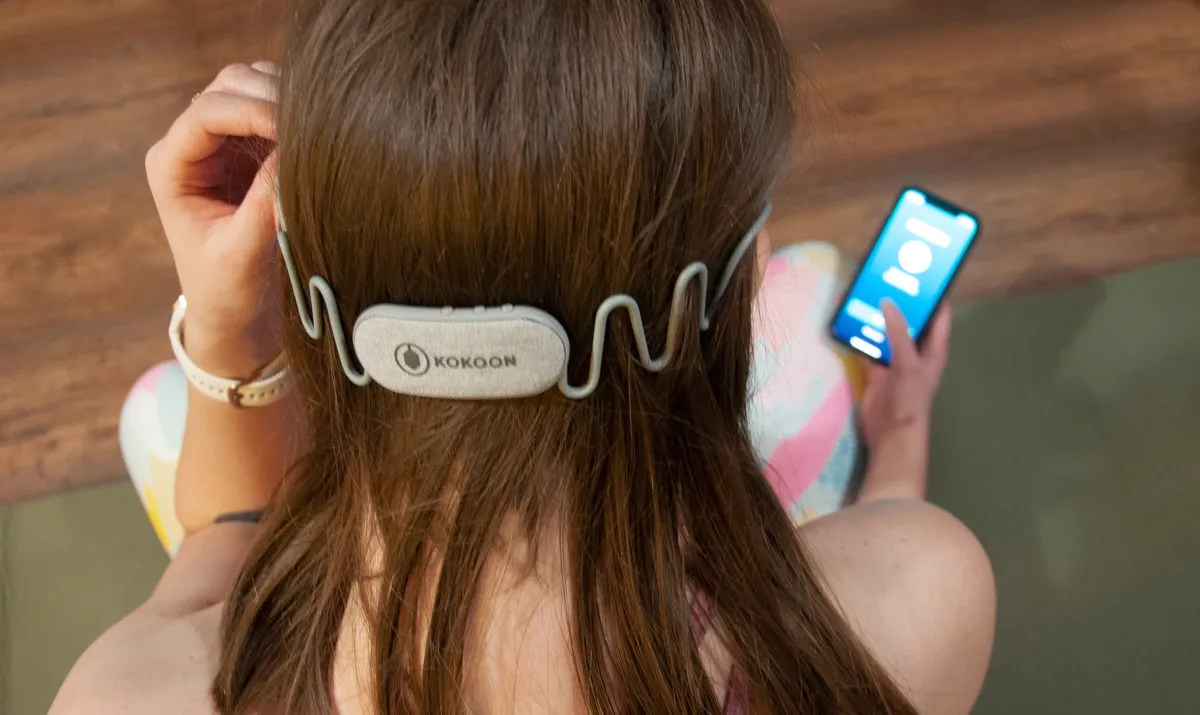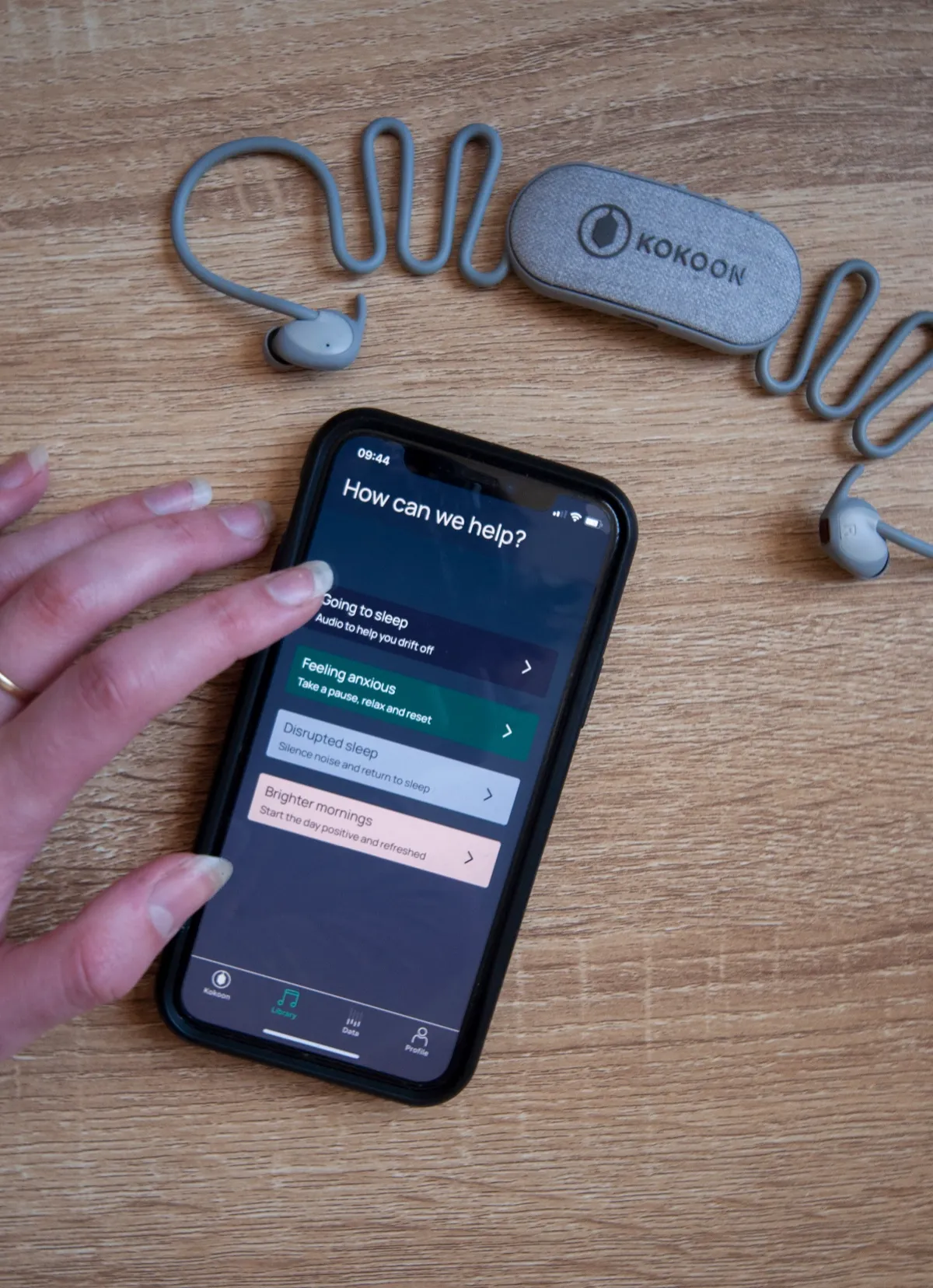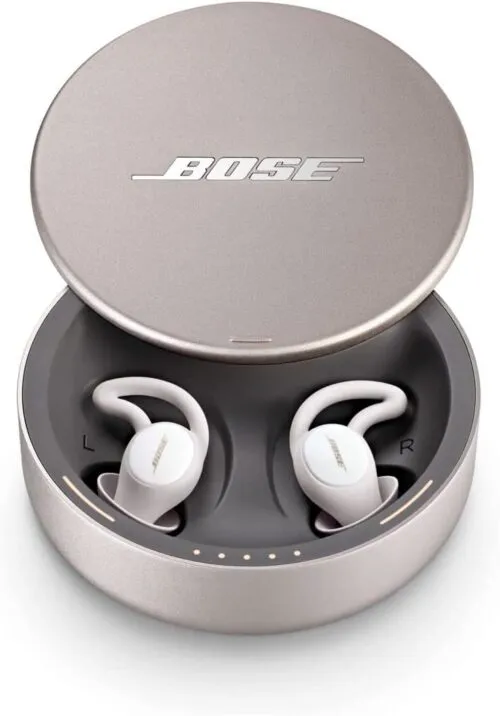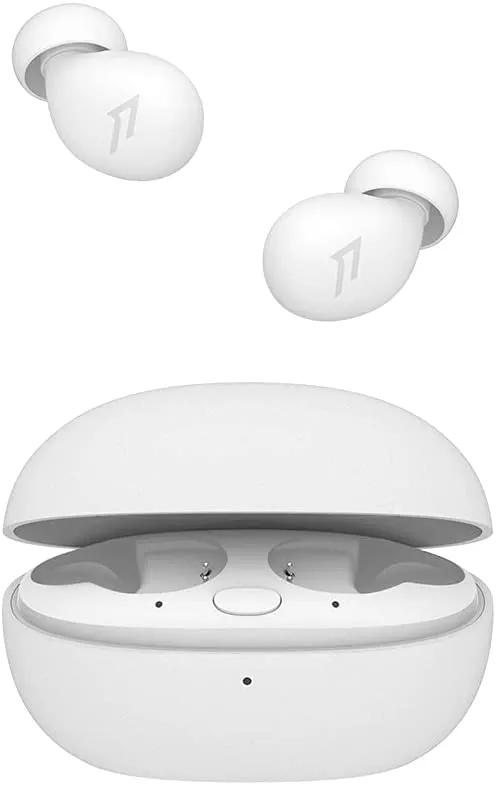Buy from Kokoon (£183.99)
Smart tech has been monitoring our sleep for ages, but while my smart watch can tell me how good (or bad) my night was, it can only make vague recommendations as to how to improve my nightly routine. I know that sleep hygiene is key to getting the perfect night's sleep but often, when I'm led in the dark staring at the ceiling, I can't help but scroll social media on my phone, my boredom overcoming my understanding of blue light.
Despite this, I approached the Kokoon Nightbuds with a healthy dose of hesitation. These earbuds claim to use intelligent audio "to help you improve and enjoy your sleep". Effectively, they're earphones you can use to listen to music or a podcast to go to bed with, that will also block out any normal disturbances like snoring or, if you’re on my street, emergency sirens. Then, when you begin to drift off, the heart rate sensor in the Nightbuds picks up these sleepy signals to turn down the audio you're listening to. The app also provides soundscapes (think background noise) or mindfulness sessions to help you en route to the land of nod.
My first impressions were surprisingly good. The Nightbuds came with a soft shell carry case, and the buds themselves were much lighter than the headphones I'd tried a couple of years ago. I was also impressed by how many different options there are for the rubber tips – as someone who struggles to find earbuds that sit comfortably in small ears, I really appreciated the XS size.
As with most tech these days, you need a smartphone to get any real benefit. The Kokoon app will only work with Kokoon audio devices, which is a shame, as you'll learn later. However, I was glad to find out that you can run other apps alongside the Kokoon, meaning I can have white noise in the background of my favourite podcast, for example.
After spending some time with the Kokoon Nightbuds, I have to say they really do help in certain scenarios. When you're having trouble nodding off, the Nightbuds step up, especially for someone who's never been very good at meditation and relaxation. But whether you can afford to spend £229.99 on something you'll use once- or twice-weekly is another matter.
- Looking for more sleep gadgets? Check out our list of the 19 top technologies to help you nod off
Functionality
Comfort is high priority when it comes to sleep tech. When I spent my first night with the Kokoon buds, I admit, I had some regrets the next morning. I had woken up a couple of times with pain in my ears, and I had to toss and turn for what felt like hours (although the Kokoon app told me it was no more than a few minutes) to get comfy. In fact, the experience put me off wearing them again for at least a few nights.
Then, I found myself lying awake, brain buzzing, unable to sleep. I thought about getting out of bed to get a book or my usual headphones, but the Nightbuds were on my bedside table. I put them on, and chose an audio file from the 'Disrupted sleep' collection. They felt a lot better in my ears this second time, and I made a little dent in my pillow so I could lie on my side with them on and not feel like they were digging into my skull. I don't remember anything else, so I must've fallen asleep pretty quickly.
Since then, I've used them a couple of times a week and find they're much easier to wear now. They're still not what I'd call comfortable, but they're not unpleasant.
I did wonder why the two earpieces are connected, while Kokoon's competitors use the standard separate buds. The answer makes a lot of sense, though: housing the electronics and battery inside each earbud would make them a lot thicker, and a lot more uncomfortable. By relocating these bulky bits to the back of the neck, Kokoon have achieved the world's thinnest ear bud by a very significant margin, according to the company's founder and CEO Tim Antos. Antos says that the design team experimented with several different designs, including single buds, but the size of the battery made it difficult to get anything truly wireless to fit comfortably. For comparison, the Bose Sleep Buds are over two times thicker in the ear.

(You are also supposed to wear them underneath your hair, but for the purposes of this review I've included an image of me wearing them wrong.)
I was a little worried that they might get caught in the night, and I might accidentally pull them apart (or choke myself), but so far there have been no casualties, save the one time my left rubber earpiece came off and nearly ended up in the washing machine with the sheets.
One small annoyance is the Nightbuds' battery life. Other reviewers have gotten 10-12 hours out of a full charge, but I more often than not would forget to turn the buds off, so one charge only lasted me one night. It's not a big deal, but there was at least one night where I felt I could do with using them to relax but couldn't because I hadn't charged them.
Sleep data
The Nightbuds collect data and present your different stages of sleep as a pie chart in the app. While this is interesting, it doesn't tell me much – I don't know how much REM sleep I should be getting, or whether I should be worried about how little time I spend in deep sleep.
They weren't as sensitive as other smart tech I've worn to bed, like my Fitbit smartwatch. They do use the same detection method, though, called photoplethysmography or PPG. This involves shining a light onto the skin and using a photodetector measure how much light is reflected back. The amount of light reflected is affected by the volume of blood moving under that spot, and this information about circulation can be used to calculate heart rate. PPG devices use the variability in heart rate to infer a certain sleep stage.
Read more about sleep:
- What happens when we let people sleep when they want to?
- You're not alone: The pandemic has ruined all of our sleep
The Nightbuds' should pick up reliable data, as their sensor sits in close proximity to one of the largest arteries in the body. Yet my app frequently has blocks of time without information.
This isn't too big a problem for me, because I'm not hoping to get a detailed analysis of my sleep patterns. I just want help getting to sleep. But for anyone who has more persistent problems, or who just loves to know the minutiae of every bodily metric, the Kokoon app will leave them wanting.
Features
The Kokoon app is easy to use and comes with quite a few audio files ready to try out, although if you are a regular user you'll soon run out of things to listen to. That's why it's so great that the app can be used in conjunction with others, like Headspace for meditation, or Audible for listening to books. I really like how the app automatically runs white noise in the background – I can't imagine I would've opted to have it on if given the choice, but I immediately found it soothing. Of course, you can turn it off if you want.
The Kokoon Nightbuds are noise masking, rather than noise cancelling. They use dynamic sounds in order to mask out things like dogs barking or your partner's snoring. Antos even says they've heard from new parents who are taking it in turns to get up in the night, using the buds to sleep through their baby's cries when it's their night off.Kokoon also say the buds have an audio seal that prevents noise leakage.

They are most certainly designed for the nighttime. These won't be replacing your daytime audio tech any time soon, not just because their audio quality can't match up but their comfort can't beat a nice, cushioned pair of over-ear headphones.
Another useful feature is the ability to programme a wake-up alarm, though I much prefer a sunrise alarm clock over a sound-based one.
Verdict
These are remarkably convenient, especially if you're the type to listen to music as you fall asleep and also monitor your body's mechanics. Two devices become one with Nightbuds.
Priced at £299.99, I can see why some reviewers have called them expensive, and they are more than most competitors. However, If I use them twice a week for the next year, I estimate each night I need help sleeping costs me £2.20. If I opt for Kokoon's annual subscription, which spreads the cost and charges you £149 as a yearly Direct Debit, I'm down to £1.43 per use. For me, that's a worthy investment.
Buy from Kokoon (£183.99)
SQUIRREL_13093687
Alternatives
Bose Sleepbuds II

The Bose Sleepbuds II frequently top lists of the best sleep earbuds. They play relaxing sounds to help you drift off at night, whether that be the sound of a campfire, rain falling down a window or the sound of 'Wanderlust' - whatever that means.
The headphones come with an app that allows you to pick out your sound, and a charging case to put the earbuds in when you're not using them.
While they are by no means the cheapest earbuds to help you get to sleep, they're the closest contender to Kokoon's Nightbuds in overall quality.
SQUIRREL_TEXT_13099455
1MORE ComfoBuds Z

Unlike Bose's Sleepbuds II above, the 1More ComfoBuds Z work as both sleep earphones and general use ones for music, podcasts and anything you'd normally use headphones for. Like Bose's headphones, you can also choose from a range of relaxing scenarios like a stream or the sound of wind.
A big positive going for the ComfoBuds is their timer. You can set them to turn off after select amounts of time so they're not playing throughout the night.
These are going to be a great option if you're looking to test out sleep earbuds on a slightly tighter budget.
SQUIRREL_TEXT_13093685
HoomBand Wireless

The HoomBand takes a different approach to most other sleep earbuds, using a headband to play sound instead. This allows for a more comfortable nights sleep, especially if you're a side sleeper.
It connects to your phone via Bluetooth and uses an app to pick out different sounds to get you to fall asleep. There is over 100 hours of guided meditations and relaxing scenarios to choose from, and it also doubles up as a pair of normal headphones.
